Fleurs du Mal Magazine


Or see the index

Monolietjes
Boven hun tijd zijn ze uitstekend gebleven, die
vele monoliedjes uit de transistorradio. Er was
geen stereo nog maar deze oren hoorden wel al
in een taal die ze verstonden hoe ze zouden blijven
hangen. Fijn afgedaald terug naar blij verlangen,
halsstarrig glanzend als muntjes in een fontein.
Bert Bevers
Monolietjes
Gedicht
Ongepubliceerd
• fleursdumal.nl magazine
More in: Archive A-B, Archive A-B, Bevers, Bert
New and selected poets from the
great Pulitzer Prize–winning poet
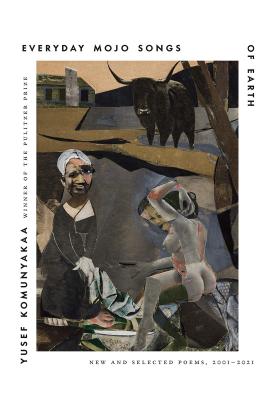
Everyday Mojo Songs of Earth brings together selected poems from the past twenty years of Yusef Komunyakaa’s work, as well as new poems from the Pulitzer Prize winner.
Komunyakaa’s masterful, concise verse conjures arresting images of peace and war, the natural power of the earth and of love, his childhood in the American South and his service in Vietnam, the ugly violence of racism in America, and the meaning of power and morality.
The new poems in this collection add a new refrain to the jazz-inflected rhythms of one of our “most significant and individual voices” (David Wojahn, Poetry).
Komunyakaa writes of a young man fashioning a slingshot, workers who “honor the Earth by opening shine / inside the soil,” and the sounds of a saxophone filling a dim lounge in New Jersey. As April Bernard wrote in The New York Times Book Review, “He refuses to be trivial; and he even dares beauty.”
These songs run along dirt roads
& highways, crisscross lonely seas
& scale mountains, traverse skies
& underworlds of neon honkytonk,
Wherever blues dare to travel.
Yusef Komunyakaa (born James William Brown, April 29, 1941) is an American poet who teaches at New York University and is a member of the Fellowship of Southern Writers. Komunyakaa is a recipient of the 1994 Kingsley Tufts Poetry Award, for Neon Vernacular and the 1994 Pulitzer Prize for Poetry. He also received the Ruth Lilly Poetry Prize. Komunyakaa received the 2007 Louisiana Writer Award for his enduring contribution to the poetry world. His subject matter ranges from the black experience through rural Southern life before the Civil Rights era and his experience as a soldier during the Vietnam War.
Everyday Mojo Songs of Earth:
New and Selected Poems, 2001-2021
by Yusef Komunyakaa
Publisher: Farrar, Straus and Giroux
(June 15, 2021)
Language: English
288 pages
ISBN-10 : 0374600139
ISBN-13 : 978-0374600136
Hardcover $25.60
Paperback $18.00
• fleursdumal.nl magazine
More in: #Editors Choice Archiv, - Book News, - Bookstores, Archive K-L, Archive K-L, Black Lives Matter

La débauche
(extrait)
Bacchus ! qui vois notre débauche,
Par ton saint portrait que j’ébauche
En m’enluminant le museau
De ce trait que je bois sans eau ;
Par ta couronne de lierre,
Par la splendeur de ce grand verre,
Par ton thyrse tant redouté,
Par ton éternelle santé,
Par l’honneur de tes belles fêtes,
Par tes innombrables conquêtes,
Par les coups non donnés, mais bus,
Par tes glorieux attributs,
Par les hurlements des Ménades,
Par le haut goût des carbonnades,
Par tes couleurs blanc et clairet,
Par le plus fameux cabaret,
Par le doux chant de tes orgies,
Par l’éclat des trognes rougies,
Par table ouverte à tout venant,
Par les fins mors de ta cabale,
Par le tambour et la cymbale,
Par tes cloches qui sont des pots,
Par tes soupirs qui sont des rots,
Par tes hauts et sacrés mystères,
Par tes furieuses panthères,
Par ce lieu si frais et si doux,
Par ton bouc, paillard comme nous,
Par ta grosse garce Ariane,
Par le vieillard monté sur l’âne,
Par les satyres, tes cousins,
Par la fleur des plus beaux raisins,
Par ces bisques si renommées,
Par ces langues de boeuf fumées,
Par ce tabac, ton seul encens,
Par tous les plaisirs innocents,
Par ce jambon couvert d’épice,
Par ce long pendant de saucisse,
Par la majesté de ce broc,
Par masse, tope, cric et croc,
Par cette olive que je mange,
Par ce gai passeport d’orange,
Par ce vieux fromage pourri,
Bref par Gillot, ton favori,
Reçois-nous dans l’heureuse troupe,
Des francs chevaliers de la coupe,
Et, pour te montrer tout divin,
Ne la laisse jamais sans vin.
Marc-Antoine Girard de Saint-Amant
(1594 – 1661)
La débauche
(extrait)
• fleursdumal.nl magazine
More in: # Classic Poetry Archive, Archive G-H, Archive S-T, Archive S-T
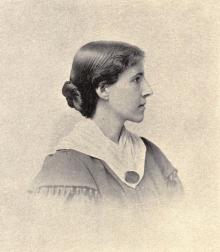
“We as women”
There’s a cry in the air about us–
We hear it before, behind–
Of the way in which “We, as women,”
Are going to lift mankind!
With our white frocks starched and ruffled,
And our soft hair brushed and curled–
Hats off! for “We, as women,”
Are coming to save the world.
Fair sisters, listen one moment–
And perhaps you’ll pause for ten:
The business of women as women
Is only with men as men!
What we do, “We, as women,”
We have done all through our life;
The work that is ours as women
Is the work of mother and wife.
But to elevate public opinion,
And to lift up erring man,
Is the work of the Human Being;
Let us do it–if we can.
But wait, warm-hearted sisters–
Not quite so fast, so far.
Tell me how we are going to lift a thing
Any higher than we are!
We are going to “purify politics,”
And to “elevate the press.”
We enter the foul paths of the world
To sweeten and cleanse and bless.
To hear the high things we are going to do,
And the horrors of man we tell,
One would think, “We, as women,” were angels,
And our brothers were fiends of hell.
We, that were born of one mother,
And reared in the self-same place,
In the school and the church together,
We of one blood, one race!
Now then, all forward together!
But remember, every one,
That ’tis not by feminine innocence
The work of the world is done.
The world needs strength and courage,
And wisdom to help and feed–
When, “We, as women” bring these to man,
We shall lift the world indeed.
Charlotte Perkins Gilman
(1860-1935)
“We as women”
Suffrage Songs and Verses
• fleursdumal.nl magazine
More in: # Classic Poetry Archive, Archive G-H, Archive G-H, Feminism
Four Quartets: Poetry in the Pandemic by Jeffrey Levine (Author, Editor), Kristina Marie Darling (Author, Editor). Praised as “an extraordinary bardic chant and threnody for humanity,” Four Quartets is a transcendent and ultimately transformative book of poetry written through the COVID-19 pandemic.
 In this timely anthology, established and emerging poets bear powerful witness to the COVID-19 pandemic in writing that reels from collective grief and uncertainty. This volume consists of sixteen separate chapbooks, and a collection of pandemic-era photography, which are unified by a shared narrative: public and private experiences of quarantine, and the impulse toward creation during a time of enormous upheaval, injustice, and protest.
In this timely anthology, established and emerging poets bear powerful witness to the COVID-19 pandemic in writing that reels from collective grief and uncertainty. This volume consists of sixteen separate chapbooks, and a collection of pandemic-era photography, which are unified by a shared narrative: public and private experiences of quarantine, and the impulse toward creation during a time of enormous upheaval, injustice, and protest.
Each voice brings with it a deeply personal account of this globally historic moment, and in doing so, conveys the urgency of introspection, of isolation, and of revolution.
These pieces feature B. A. Van Sise, Jimmy Santiago Baca, Yusef Komunyakaa, Laren McClung, Stephanie Strickland, Mary Jo Bang, Shane McCrae, Ken Chen, J. Mae Barizo, Dora Malech, Jon Davis, Lee Young-Ju, Jae Kim, Rachel Eliza Griffiths, A. Van Jordan, Maggie Queeney, Traci Brimhall, Brynn Saito, Denise Duhamel, and Rick Barot.
Kristina Marie Darling is the author of over twenty books of poetry. Her awards include two Yaddo residencies and a Hawthornden Castle Fellowship, as well as grants from the Whiting Foundation and Harvard University’s Kittredge Fund. She has twice been appointed as a Visiting Artist at the American Academy in Rome. Her poems and essays appear in The Gettysburg Review, New American Writing, The Mid-American Review, Third Coast, The Columbia Poetry Review, Verse Daily, and elsewhere.
Four Quartets: Poetry in the Pandemic
by Kristina Marie Darling & Jeffrey Levine
Publisher: Tupelo Press (November 25, 2020)
Language: English
296 pages
ISBN-10: 1946482455
ISBN-13: 978-1946482457
Paperback $25.95
Hardcover $39.95
• fleursdumal.nl magazine
More in: #Editors Choice Archiv, #More Poetry Archives, Archive C-D, Archive C-D, Archive K-L, Archive K-L
De Nacht van de Poëzie is al veertig jaar een begrip. Het grootste poëziefestival van het jaar vond voor het eerst in 1980 plaats, in wat toen nog Muziekcentrum Vredenburg heette.

De Nacht trok door de jaren heen bomvolle zalen met legendarische optredens tot diep in de nacht van grote namen als Annie M.G. Schmidt, Lucebert, Hugo Claus, Rutger Kopland en Judith Herzberg, en vele jonge dichters die later legendarisch werden.
De Nacht is terug! Vorig jaar moesten we helaas overslaan vanwege de onoverzichtelijke corona-ontwikkelingen, maar dit jaar zal alsnog de 38ste editie van de illustere Nacht plaatsvinden. Voorlopig nog steeds in een aangepaste vorm, want groen licht om op 2 oktober alweer in een bomvolle zaal te zitten is er op dit moment nog niet.
Tijdens deze ‘limited edition’ in de Grote Zaal van TivoliVredenburg presenteren Piet Piryns en Ester Naomi Perquin als vanouds optredens van de beste dichters van dit moment, afgewisseld met muzikale entr’actes. Het motto van dit jaar is geleverd door Vrouwkje Tuinman: ’s Nachts woon ik zelden waar mijn bed staat. In die regel klinkt zowel een zoete herinnering aan een onbezorgd verleden door, als een hoopvolle wens voor een toekomst zonder afstand, mondkapjes en avondklok; de afsluiting van een periode waarin we veel te vaak waren overgeleverd aan ons eigen bed.
Hoe de omstandigheden op 2 oktober ook zullen zijn: deze Nacht gaat door! Er zullen optredens zijn van Dichter des Vaderlands Lieke Marsman, Vrouwkje Tuinman, K. Michel, Lisette Ma Neza, Edward van de Vendel, Maria Barnas, Maartje Smits, Vrouwkje Tuinman, Erwin Mortier, Rosa Schogt, Bart Moeyaert, Meity Völke, Arjen Duinker, Wout Waanders, Paul Demets, Liesbeth Lagemaat, Mattijs Deraedt, Maarten van der Graaff en Joost Prinsen.
Dit jaar worden de muzikale entr’actes verzorgd door Claudia de Breij, Maarten Engeltjes en zijn barokorkest PRJCT Amsterdam en de Marokkaanse muzieksensatie Aicha Tachinouite. een solo optreden van Jett Rebel, Thijs Boontjes Dans- en Showorkest, en de Belgische ontdekking Naima Joris.
International Literature Festival Utrecht 2021
De 38ste Nacht van de Poëzie
(limited edition)
zaterdag 2 oktober 2021
19:30 – 22:30 uur
TivoliVredenburg – Utrecht
Grote Zaal
Meer informatie op facebook pagina:
https://www.facebook.com/events/920848112030990/
Grote Zaal TivoliVredenburg
Vredenburgkade 11
3511WC Utrecht Netherlands
• fleursdumal.nl magazine
More in: # Music Archive, #More Poetry Archives, AUDIO, CINEMA, RADIO & TV, Literary Events, Nacht van de Poëzie
Joanna Klink‘s fifth book begins with poems of personal loss–a tree ripped out by a windstorm, a friendship broken off after decades, the nearing death of parents.
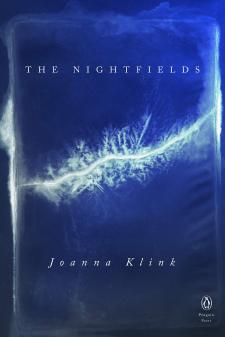 Other poems take on the cost of not loving fully, or are written from bewilderment at the accumulation of losses and at the mercilessness of having, as one ages, to rule things out. There are elegies for friends, and a group of devotional poems.
Other poems take on the cost of not loving fully, or are written from bewilderment at the accumulation of losses and at the mercilessness of having, as one ages, to rule things out. There are elegies for friends, and a group of devotional poems.
The Nightfields closes with thirty-one metaphysical poems inspired by the artist James Turrell’s Roden Crater, an extinct volcano in Arizona that Turrell has been transforming into an observatory for the perception of time. The sequence unfolds as a series of revelations that begin in psychic fear and move gradually toward the possibility of infinitude and connection.
Joanna Klink is the author of five books of poetry. She has received awards and fellowships from the Rona Jaffe Foundation, Jeannette Haien Ballard, Civitella Ranieri, the Bogliasco Foundation, the American Academy of Arts and Letters, the Trust of Amy Lowell, and the John Simon Guggenheim Memorial Foundation. She is teaching at the Michener Center in Austin. Her most recent book, The Nightfields, was published July 7, 2020 by Penguin Books.
( . . . )
When the wind pushes
branches in and out of
shade it is an opening,
as every small gesture
toward another person is
incomprehensibly alive.
Will you be part of the
stoneless passage?
( . . . )
A new collection from a poet whose books “are an amazing experience: harrowing, ravishing, essential, unstoppable” (Louise Glück)
The Nightfields
by Joanna Klink (Author)
Publisher: Penguin Books
July 7, 2020
Language: English
Paperback: 112 pages
ISBN-10: 0143135392
ISBN-13: 978-0143135395
Price: $20.00
• fleursdumal.nl magazine
More in: #Editors Choice Archiv, - Book News, - Bookstores, Archive K-L, Archive K-L
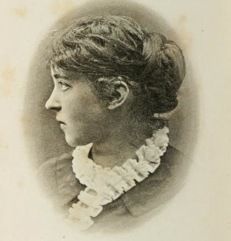
Évolutions
Où sont-ils disparus, les Peuples innombrables,
Autrefois échappés des gouffres du néant.
Pareils aux légions dévorées par les sables
Que la vague dépose au bord de l’Océan ?
Un jour, ils sont venus en conquérants superbes,
Ils ont soumis le globe, ils ont régné sur lui ;
Puis un seul coup de faux qui tranchait le champ d’herbes
Les a plongés soudain dans l’éternelle nuit.
On a vu s’écrouler, leurs pouvoirs séculaires,
Babylone, Ninive, et Thèbes et Memphis ;
Ces cités n’ont laissé que débris éphémères,
Témoins inanimés, argile enseveli.
Dans ces lieux aujourd’hui, vastes déserts stériles,
S’étalaient les splendeurs d’un luxe raffiné.
Et le peuple joyeux qui remplissait les villes
A l’immortalité se croyait destiné.
Il n’a fallu qu’un jour et peut-être qu’une heure
Pour renverser leurs murs, leurs temples et leurs dieux,
Pour faire des palais somptueux la demeure
Des serpents du désert et des oiseaux des cieux.
D’autres ont succédé, rescapés des naufrages ;
D’autres ont recueilli leurs vestiges divers.
Ruines disséminées sur l’Océan des âges,
Épaves d’un vaisseau gisant au fond des mers.
Alors, Art et Science ont entr’ouvert leurs ailes
Comme un aigle superbe au vol capricieux ;
Ils se sont envolés dans des contrées nouvelles
Pour y refaire un nid sous l’éclat d’autres cieux.
Ce fut d’abord l’Asie où l’histoire du monde
Naît sous les verts bosquets de la terre d’Éden,
L’Asie, astre éclatant perçant la nuit profonde
Tel le soleil levant dans l’ombre du matin.
Avec elle l’Afrique et la fertile Égypte
Où le Nil apparaît comme un dieu bienfaisant,
Thèbes et sa nécropole énorme, sombre crypte
D’où les morts assemblés regardaient le présent.
Ils choisirent après, l’Europe, l’Italie,
Ce pays mollement bercé par les flots bleus,
Où, dans le vague écho d’une plainte affaiblie,
L’onde vient expirer sur le sable onduleux.
L’Italie, où semblable à quelque pierre fine
Enchâssée au milieu d’un écrin précieux,
Rome, que soutenait la volonté divine,
Des peuples étonnés éblouissait les yeux.
Elle-même à son tour fut prise et renversée ;
Elle a vu se ternir sa gloire et sa splendeur ;
Ce qu’il reste en ce jour de sa beauté passée
N’est qu’un lointain reflet de sa vieille grandeur.
Puis ce fut tout le Nord de l’Europe ignorée
Qui devint le séjour du savoir et des arts ;
C’est elle maintenant la première contrée,
Et les hommes sur elle attachent leurs regards.
Jusqu’à quand ? — Nul ne sait. Il est un Nouveau Monde
Au-delà des grands flots qui s’accroît jour par jour ;
Sa frontière est immense et sa terre est féconde,
L’Amérique, peut-être, aura demain son tour.
Puis elle passera. — Quelle terre lointaine
Recevra le dépôt par d’autres égaré ?
Dans quelle région, chez quelle race humaine
Luiront encor les feux de ce flambeau sacré ?
Oui ! dans quelque mille ans, dans moins longtemps peut-être,
Où seront nos palais, nos empires, nos lois ? —
Le Temps, ce niveleur farouche, ce grand maître,
Aura tout transformé pour la centième fois.
Et nos belles cités dont nous nous faisons gloire,
Où devaient à toujours se succéder nos fils,
Ne seront plus qu’un rêve à la triste mémoire,
Comme vous, ô Ninive, ô Thèbes, ô Memphis !
Bevaix, 28 août 1882
Alice De Chambrier
(1861-1882)
Évolutions
• fleursdumal.nl magazine
More in: Alice De Chambrier, Archive C-D, Archive C-D, Chambrier, Alice De

Just A Woman
You ask me why I love her;
Not a charm can you discover!
Would you see
The heart that a shut rose is,
And whose beauty ne’er uncloses
Save for me?
She is not rich or clever,
But her speeches thrill me ever,
And with bliss
My heart her whisper flutters,
Though the wisest word she utters
Is a kiss.
All evil things have shunned her,
And with a wide-eyed wonder
Is she tasked,
What lavish god has given
In her earth so much of heaven
All unasked?
She has no gifts or graces,
But the gladness in her face is
Sought of kings;
She cannot chant a measure,
But her heart with a grave pleasure
Ever sings.
Her gown is of the whitest
But the hem is soiled the slightest:
Little worth,
She has no wings to fly with,
And she prefers to hie with
Me on earth.
There is no hint of heaven
Or glimpse of deep thought even
In her eyes;
She is warm and she is human,
Just a weak and wilful woman —
Not too wise.
Her thousand beauties singing,
I have not said how clinging
Are her arms;
But, not loved and not the lover
Dare you ever hope discover
Half her charms?
Arthur Adams
(1872-1936)
Just A Woman
• fleursdumal.nl magazine
More in: Adams, Arthur, Archive A-B, Archive A-B, THEATRE
Kaveh Akbar’s exquisite, highly anticipated follow-up to Calling a Wolf a Wolf.
 With formal virtuosity and ruthless precision, Kaveh Akbar’s second collection takes its readers on a spiritual journey of disavowal, fiercely attendant to the presence of divinity where artifacts of self and belonging have been shed. How does one recover from addiction without destroying the self-as-addict?
With formal virtuosity and ruthless precision, Kaveh Akbar’s second collection takes its readers on a spiritual journey of disavowal, fiercely attendant to the presence of divinity where artifacts of self and belonging have been shed. How does one recover from addiction without destroying the self-as-addict?
And if living justly in a nation that would see them erased is, too, a kind of self-destruction, what does one do with the body’s question, “what now shall I repair?” Here, Akbar responds with prayer as an act of devotion to dissonance―the infinite void of a loved one’s absence, the indulgence of austerity, making a life as a Muslim in an Islamophobic nation―teasing the sacred out of silence and stillness.
Richly crafted and generous, Pilgrim Bell’s linguistic rigor is tuned to the register of this moment and any moment. As the swinging soul crashes into its limits, against the atrocities of the American empire, and through a profoundly human capacity for cruelty and grace, these brilliant poems dare to exist in the empty space where song lives―resonant, revelatory, and holy.
Kaveh Akbar founded and edits Divedapper, where he interviews major voices in contemporary poetry. His poems have appeared in The New Yorker, Poetry, Tin House, APR, PBS NewsHour, and elsewhere. He is the author of the chapbook Portrait of the Alcoholic (Sibling Rivalry Press, January 2017) and full-length collection Calling a Wolf a Wolf (Alice James Books, September 2017). Akbar has received a Pushcart and a Lucille Medwick Memorial Award from the Poetry Society of America. In 2016, Akbar was a recipient of the Ruth Lilly and Dorothy Sargent Rosenberg Poetry Fellowship from the Poetry Foundation. He was born in Tehran, Iran, and is currently a professor in the MFA program at Purdue University and in the low-residency program at Randolph College.
(. . .)
Corporeal friends are
spiritual enemies, said
Blake, probably gardening
in the nude. Today I’m trying
to scowl more, mismatch
my lingerie. Nobody
seems bothered enough.
(. . .)
Pilgrim Bell
Poems
by Kaveh Akbar
Publisher: Graywolf Press
August 3, 2021
Language: English
Paperback
80 pages
ISBN-10 : 1644450593
ISBN-13 : 978-1644450598
$13.70
• fleursdumal.nl magazine
More in: #Editors Choice Archiv, - Book News, - Bookstores, Archive A-B, Archive A-B
The definitive anthology of Jim Morrison‘s writings with rare photographs and numerous handwritten excerpts of unpublished and published poetry and lyrics from his 28 privately held notebooks.
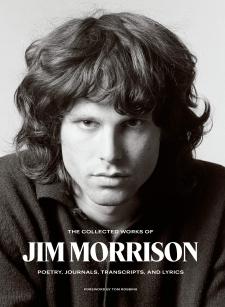 You can also hear Jim Morrison’s final poetry recording, now available for the first time, on the CD or digital audio edition of this book, at the Village Recorder in West Los Angeles on his twenty-seventh birthday, December 8, 1970.
You can also hear Jim Morrison’s final poetry recording, now available for the first time, on the CD or digital audio edition of this book, at the Village Recorder in West Los Angeles on his twenty-seventh birthday, December 8, 1970.
The audio book also includes performances by Patti Smith, Oliver Ray, Liz Phair, Tom Robbins, and others reading Morrison’s work.
Created in collaboration with Jim Morrison’s estate and inspired by a posthumously discovered list entitled “Plan for Book,”
The Collected Works of Jim Morrison is an almost 600-page anthology of the writings of the late poet and iconic Doors’ front man. This landmark publication is the definitive opus of Morrison’s creative output—and the book he intended to publish. Throughout, a compelling mix of 160 visual components accompanies the text, which includes numerous excerpts from his 28 privately held notebooks—all written in his own hand and published here for the first time—as well as an array of personal images and commentary on the work by Morrison himself.
 This oversized, beautifully produced collectible volume contains a wealth of new material—poetry, writings, lyrics, and audio transcripts of Morrison reading his work.
This oversized, beautifully produced collectible volume contains a wealth of new material—poetry, writings, lyrics, and audio transcripts of Morrison reading his work.
Not only the most comprehensive book of Morrison’s work ever published, it is immersive, giving readers insight to the creative process of and offering access to the musings and observations of an artist whom the poet Michael McClure called “one of the finest, clearest spirits of our times.”
This remarkable collector’s item includes:
• Foreword by Tom Robbins; introduction and notes by editor Frank Lisciandro that provide insight to the work; prologue by Anne Morrison Chewning
• Published and unpublished work and a vast selection of notebook writings
• The transcript, the only photographs in existence, and production notes of Morrison’s last poetry recording on his twenty-seventh birthday
• The Paris notebook, possibly Morrison’s final journal, reproduced at full reading size
• Excerpts from notebooks kept during his 1970 Miami trial
• The shooting script and gorgeous color stills from the never-released film HWY
• Complete published a I Look Back”: a compelling autobiography in poem form
• Family photographs as well as images of Morrison during his years as a performer
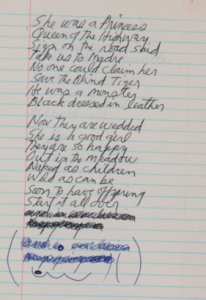
James Douglas Morrison
(1943-1971) was a poet, filmmaker, screenwriter, and the lead singer of as well as the lyricist and a composer for The Doors. Prior to his death, Morrison self-published three limited-edition volumes of his poetry: The Lords/Notes on Vision (1969), The New Creatures (1969), and An American Prayer (1970). Simon & Schuster published the combined The Lords and the New Creatures in 1970. Posthumous editions of Morrison’s writings include Wilderness: The Lost Writings of Jim Morrison, Volume I (1988) and The American Night: The Lost Writings of Jim Morrison, Volume II (1990).
The Collected Works of Jim Morrison
Poetry, Journals, Transcripts, and Lyrics
By Jim Morrison, Foreword by Tom Robbins
On Sale: June 8, 2021
Publisher: Harper Design
Language: English
Hardcover: 584 pages
ISBN-10 : 0063028972
ISBN-13 : 978-0063028975
Item Weight: 4.44 pounds
Dimensions: 7.7 x 2 x 10.6 inches
$39.99
The Collected Works of Jim Morrison
CD: Poetry, Journals, Transcripts, and Lyrics
Audio CD – Unabridged.
Performed by Jim Morrison, Patti Smith, Liz Phair, Oliver Ray, Tom Robbins, Frank Lisciandro, Anne Morrison Chewning, Sefton Graham, and Ian Morrison.
Includes Jim Morrison’s final poetry recording, now available for the first time, at the Village Recorder in West Los Angeles on his 27th birthday, December 8, 1970.
Audio CD
$23.99
• fleursdumal.nl magazine
More in: #Archive A-Z Sound Poetry, #Editors Choice Archiv, Archive M-N, Archive M-N, AUDIO, CINEMA, RADIO & TV, Jim Morrison

Little Red Riding-Hood
If you listen, children, I will tell
The story of little Red Riding-hood:
Such wonderful, wonderful things befell
Her and her grandmother, old and good
(So old she was never very well),
Who lived in a cottage in a wood.
Little Red Riding-hood, every day,
Whatever the weather, shine or storm,
To see her grandmother tripped away,
With a scarlet hood to keep her warm,
And a little mantle, soft and gay,
And a basket of goodies on her arm.
A pat of butter, and cakes of cheese,
Were stored in the napkin, nice and neat;
As she danced along beneath the trees,
As light as a shadow were her feet;
And she hummed such tunes as the bumble-bees
Hum when the clover-tops are sweet.
But an ugly wolf by chance espied
The child, and marked her for his prize.
“What are you carrying there?” he cried;
“Is it some fresh-baked cakes and pies?”
And he walked along close by her side,
And sniffed and rolled his hungry eyes.
“A basket of things for granny, it is,”
She answered brightly, without fear.
“Oh, I know her very well, sweet miss!
Two roads branch towards her cottage here;
You go that way, and I’ll go this.
See which will get there first, my dear!”
He fled to the cottage, swift and sly;
Rapped softly, with a dreadful grin.
“Who’s there?” asked granny. “Only I!”
Piping his voice up high and thin.
“Pull the string, and the latch will fly!”
Old granny said; and he went in.
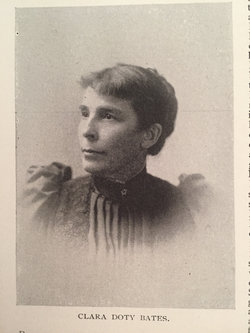
He glared her over from foot to head;
In a second more the thing was done!
He gobbled her up, and merely said,
“She wasn’t a very tender one!”
And then he jumped into the bed,
And put her sack and night-cap on.
And he heard soft footsteps presently,
And then on the door a timid rap;
He knew Red Riding-hood was shy,
So he answered faintly to the tap:
“Pull the string and the latch will fly!”
She did: and granny, in her night-cap,
Lay covered almost up to her nose.
“Oh, granny dear!” she cried, “are you worse?”
“I’m all of a shiver, even to my toes!
Please won’t you be my little nurse,
And snug up tight here under the clothes?”
Red Riding-hood answered, “Yes,” of course.
Her innocent head on the pillow laid,
She spied great pricked-up, hairy ears,
And a fierce great mouth, wide open spread,
And green eyes, filled with wicked leers;
And all of a sudden she grew afraid;
Yet she softly asked, in spite of her fears:
“Oh, granny! what makes your ears so big?”
“To hear you with! to hear you with!”
“Oh, granny! what make your eyes so big?”
“To see you with! to see you with!”
“Oh, granny! what makes your teeth so big?”
“To eat you with! to eat you with!”
And he sprang to swallow her up alive;
But it chanced a woodman from the wood,
Hearing her shriek, rushed, with his knife,
And drenched the wolf in his own blood.
And in that way he saved the life
Of pretty little Red Riding-hood.
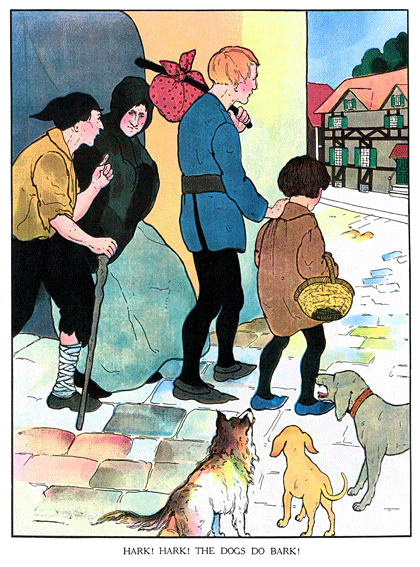
Hark, hark
The dogs do bark
Beggars are coming to town;
Some in jags,
Some in rags,
And some in velvet gowns.
Clara Doty Bates
(1838 – 1895)
Little Red Riding-Hood
Versified by Mrs. Clara Doty Bates
fleursdumal.nl magazine
More in: Archive A-B, Archive A-B, Bates, Clara Doty, Children's Poetry, Grimm, Andersen e.o.: Fables, Fairy Tales & Stories, Tales of Mystery & Imagination
Thank you for reading Fleurs du Mal - magazine for art & literature